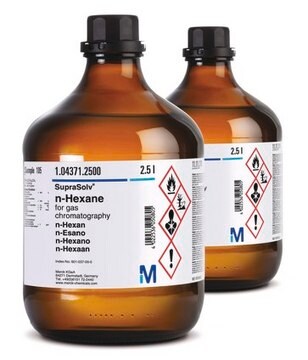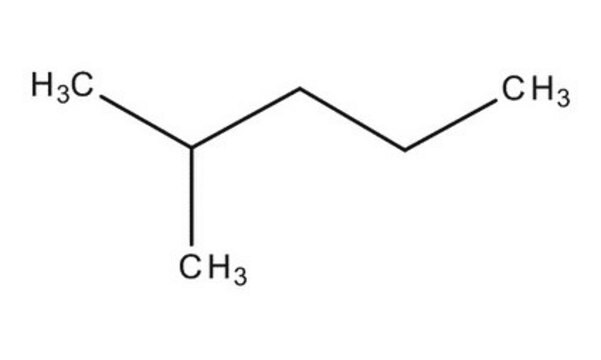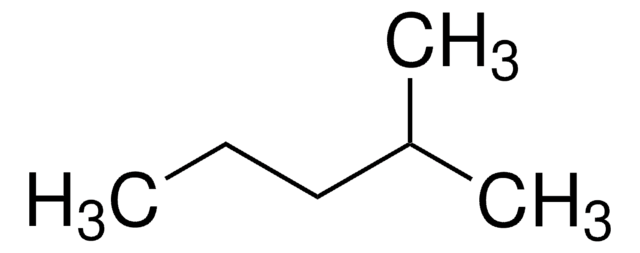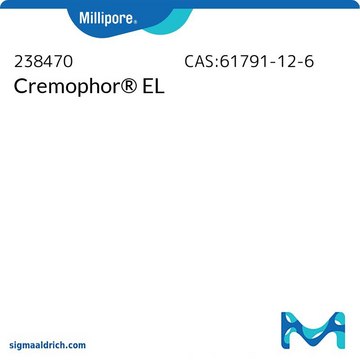1.04335
Isohexane
≥99.0% (GC), suitable for HPLC
Synonym(s):
Isohexane, 2-Methyl pentane, iso-Hexane
About This Item
Recommended Products
Product Name
Isohexane, for liquid chromatography LiChrosolv®
vapor pressure
160-190 hPa ( 20 °C)
Quality Level
product line
LiChrosolv®
grade
isocratic
Assay
≥99.0% (GC)
form
liquid
autoignition temp.
260 °C
potency
>2000 mg/kg LD50, oral (Rat)
>2000 mg/kg LD50, skin (Rabbit)
expl. lim.
1.0-7.4 % (v/v)
technique(s)
HPLC: suitable
impurities
≤0.0002 meq/g Acidity
≤0.0002 meq/g Alkalinity
≤0.005% Water
≤0.5% n-Hexane (GC)
≥60% Isohexane (GC)
evapn. residue
≤2.0 mg/L
color
APHA: ≤10
transmittance
210 nm, ≥60%
220 nm, ≥80%
245 nm, ≥98%
kinematic viscosity
0.5 cSt(20 °C)
bp
53-63 °C/1013 hPa
mp
<-50 °C
transition temp
flash point -21 °C
density
0.66 g/cm3 at 20 °C
storage temp.
2-30°C
SMILES string
C(CCC)CC
InChI
1S/C6H14/c1-3-5-6-4-2/h3-6H2,1-2H3
InChI key
VLKZOEOYAKHREP-UHFFFAOYSA-N
General description
Application
- In-house validation of accelerated solvent extraction-gas chromatography-mass spectrometry for the determination of bound 3- and 2-monochloropropanediols (MCPD) and glycidol in food products.: This study showcases the validation of a robust analytical method, crucial for ensuring food safety and compliance with regulations. The use of isohexane in the process highlights its application in improving extraction efficiency and analysis precision (Shaari et al., 2021).
- Optimized determination of polybrominated diphenyl ethers and polychlorinated biphenyls in sheep serum by solid-phase extraction-gas chromatography-mass spectrometry.: Demonstrates the refinement of extraction and detection techniques using isohexane for environmental pollutants in biological samples, enhancing the sensitivity and accuracy of these measurements (Zhang & Rhind, 2011).
- Simultaneous extraction and clean-up of polybrominated diphenyl ethers and polychlorinated biphenyls from sheep liver tissue by selective pressurized liquid extraction and analysis by gas chromatography-mass spectrometry.: This article describes a streamlined method to simultaneously extract and purify specific contaminants from liver tissue, with isohexane playing a critical role in the efficiency of the extraction process (Zhang et al., 2011).
- Selective pressurized liquid extraction of estrogenic compounds in soil and analysis by gas chromatography-mass spectrometry.: Focuses on the targeted extraction of hormone disruptors from environmental samples, where isohexane′s selective solvation properties are utilized to enhance the selectivity and yield of the analytes (Zhang et al., 2011).
- Fast sample preparation involving MASE and coupled column normal phase liquid chromatography for the rapid trace analysis of dioxins in air-dust samples from fire catastrophe emissions.: Discusses a rapid preparation and analysis method for trace contaminants in complex matrices, underscoring isohexane′s role in achieving fast and reliable results (van Beuzekom et al., 2004).
Preparation Note
Analysis Note
Isohexane (GC): ≥ 60.0 %
n-Hexane (GC): ≤ 0.5 %
Evaporation residue: ≤ 2.0 mg/l
Water: ≤ 0.005 %
Colour: ≤ 10 Hazen
Acidity: ≤ 0.0002 meq/g
Alkalinity: ≤ 0.0002 meq/g
Transmission (at 210 nm): ≥ 60 %
Transmission (at 220 nm): ≥ 80 %
Transmission (from 245 nm): ≥ 98 %
Filtered by 0.2 µm filter
Other Notes
Legal Information
Not finding the right product?
Try our Product Selector Tool.
Signal Word
Danger
Hazard Statements
Precautionary Statements
Hazard Classifications
Aquatic Chronic 2 - Asp. Tox. 1 - Flam. Liq. 2 - Skin Irrit. 2 - STOT SE 3
Target Organs
Respiratory system
Storage Class Code
3 - Flammable liquids
WGK
WGK 2
Flash Point(F)
-5.8 °F
Flash Point(C)
-21 °C
Regulatory Listings
Regulatory Listings are mainly provided for chemical products. Only limited information can be provided here for non-chemical products. No entry means none of the components are listed. It is the user’s obligation to ensure the safe and legal use of the product.
EU REACH Annex XVII (Restriction List)
Certificates of Analysis (COA)
Search for Certificates of Analysis (COA) by entering the products Lot/Batch Number. Lot and Batch Numbers can be found on a product’s label following the words ‘Lot’ or ‘Batch’.
Already Own This Product?
Find documentation for the products that you have recently purchased in the Document Library.
Customers Also Viewed
Our team of scientists has experience in all areas of research including Life Science, Material Science, Chemical Synthesis, Chromatography, Analytical and many others.
Contact Technical Service











